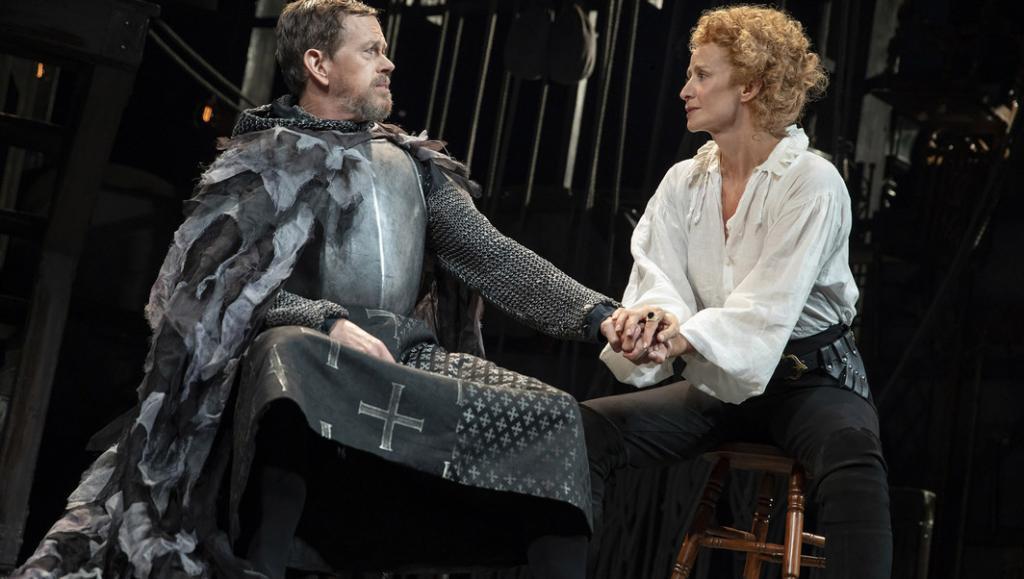To See or Not to See: Bernhardt/Hamlet

Janet McTeer is the not-so-secret weapon in Bernhardt/Hamlet, one of the most exciting and timely backstage plays to grace Broadway in recent years. McTeer stars as the inimitable Sarah Bernhardt in Theresa Rebeck’s new telling of Bernhardt’s real -life, gender-bending turn as Hamlet in 1899.
The life of Sarah Bernhardt absolutely deserves a play of its own. Born in 1844, Paris-born Bernhardt took the French theatrical world by storm in the second half of of the 19th century. She performed abroad too, and her sold-out engagements in Great Britain and the United States transformed her into a truly international celebrity in an era before Hollywood, television, or YouTube. She was also known for her larger-than-life romantic escapades, and her list of lovers included royals, diplomats, and artists. But Bernhardt was more than a string of scandalous, high-profile affairs: she was a “New Woman” who balked at gender boundaries that sought to order, categorize, and limit a woman’s activities and aspirations. Her boldness and willingness to challenge ideas of what was expected of female actors – and women in general – certainly qualifies her as someone that modern feminists might revere.
Bernhardt/Hamlet takes these ideas and runs with them. Rather than being a dense play that pours over every aspect of Bernhardt’s ridiculously fascinating life, the story settles on one production in her prolific stage career: her quest to play Hamlet. Hamlet, widely regarded as a benchmark for actors to prove their metal, is traditionally played by men, since Shakespeare was clear that his tragic hero was the Prince, not Princess, of Denmark. But, Bernhardt asks, isn’t acting all about pretending to be someone else? And hasn’t Shakespeare always played with gender roles? In the play, Bernhardt decides that she, like any great performer, should get a crack at the melancholy prince and have the opportunity to write her name amongst the other illustrious ones that have tackled this iconic role. Plus, she claims, as a woman, she’s uniquely suited to take on the part: she appears youthful enough to pass as an immature young man but seasoned enough as an actor to navigate the emotional and intellectual labyrinths that make the text and role so compelling. Bernhardt/Hamlet finds drama in Bernhardt’s journey to perform Hamlet, and it imagines her rehearsals, the backstage tensions that she might have endured, and the critics who sharpened their knives to attack the seemingly radical idea of a woman playing the Danish prince.
This production belongs entirely to Janet McTeer, who tears into her role with the same ferocity that Sarah Bernhardt might have. Her Bernhardt challenges gender tropes by being sharp, bold, aggressive, witty, sensual, and unapologetic all at once, and tempering this with a deep, subtle insecurity that any artist – regardless of gender – would struggle with: though she is someone chomping at the bit to seal her legacy and proclaim a fearless artistic statement, she is plagued with self-doubt and questions if she can pull it off.
Theresa Rebeck’s uneven writing, however, does not always give McTeer the deep, complex material that her skill deserves. The play is smart and quippy as it grapples with necessary questions about art, performance, and gender. But though the stakes are high – Bernhardt is up against the patriarchy and debtors – her success as Hamlet feels more like a foregone conclusion than a tense, risky undertaking that could potentially fail.
The play’s main weakness is most visible in the second act, when the story focuses more explicitly on Bernhardt’s relationship with her rumored lover Edmond Rostand, a French playwright and fellow fraught artist. Ultimately, this focus undermines Bernhardt’s power: the exciting Hamlet storyline gets overshadowed by a rocky love story. Though the two storylines connect in heartbreaking ways, the shift in drama threatens to make the unconventional heroine’s story more conventional, thereby diminishing the impact of what she actually accomplished: taking on one of the most iconic roles in the theatre canon in an era that was hostile to gender nonconformity. Considering the legend surrounding Sarah Bernhardt, a play that ignored her love life would be incomplete; but Hamlet/Bernhardt feels the most mundane when it’s exploring her relationship with Rostand and the romantic insecurities that come with it. McTeer and Jason Butler Harner (an excellent Rostand) are too talented to let it become mundane, but their romance is frankly less interesting than Bernhardt’s artistic mission.
Still, these quibbles about the storytelling are moot compared to the breathtaking power and command of Janet McTeer’s mesmerizing, Tony-worthy performance. Witnessing her channel and give life to Sarah Bernhardt is the closest we’ll ever get to traveling back in time and seeing her tread the boards in person.
Photo Credit: Joan Marcus


Discussion about this post